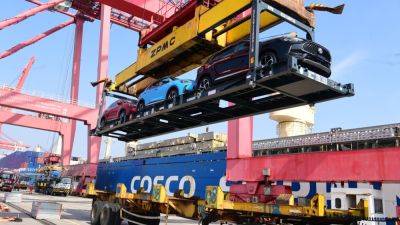Shipping giant Maersk says Red Sea vessel diversions could extend into second half of 2024
A.P. Moller-Maersk, the second-largest global ocean carrier, is advising customers to prepare for a Red Sea crisis that could stretch well into the second half of this year.
"Unfortunately, we don't see any change in the Red Sea happening anytime soon," Charles van der Steene, regional president for Maersk North America, tells CNBC. "We're advising them the longer transit routes could last through Q2 and potentially Q3. Customers will need to make sure they have the longer overall transit time built into their supply chain."
On January 5, Maersk announced that it was suspending voyages through the Red Sea and Gulf of Aden for the "foreseeable future" after the attack on the Maersk Hangzhou. After attacks on two U.S.-flagged Maersk vessels on January 24, the Maersk Detroit and Maersk Chesapeake, Maersk Line, Limited — a U.S. subsidiary of Maersk, which operates U.S.-flagged vessels independently — announced it would no longer traverse the Red Sea.
The global shipping and logistics company's cautious view of the Red Sea safety conditions comes despite a U.S.-led multinational military operation in the region, Operation Prosperity Guardian. According to U.S. defense data, Houthi rebels have either attacked or threatened commercial vessels at least 46 times since November. Despite multiple strikes by the U.S. and allies against rebel targets, Houthis have warned that their attacks"will continue until the aggression against Gaza stops."
The longer transits around the Cape of Good Hope are delaying the arrival of the empty vessels going back to Asia to pick up more U.S. imports. The delays are impacting the consistency of trade which can impact the supply chain. Van der Steene said he is urging U.S. companies to remain vigilant in







